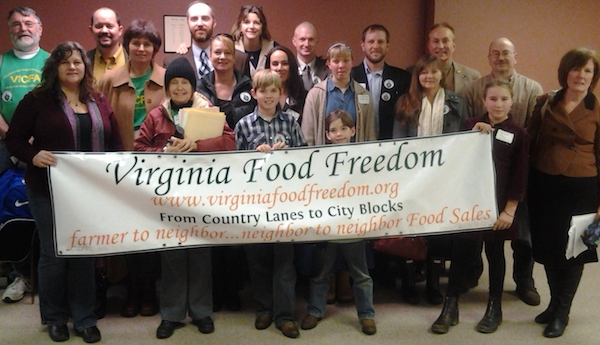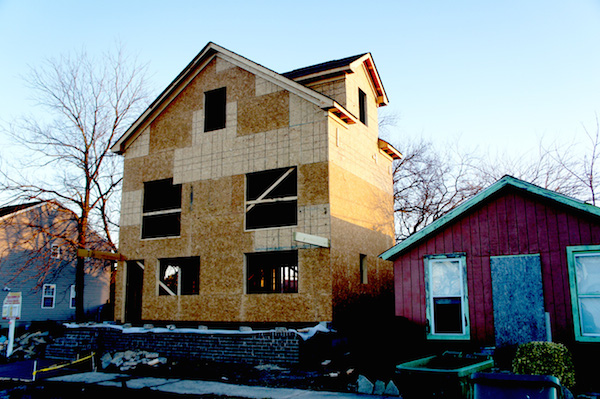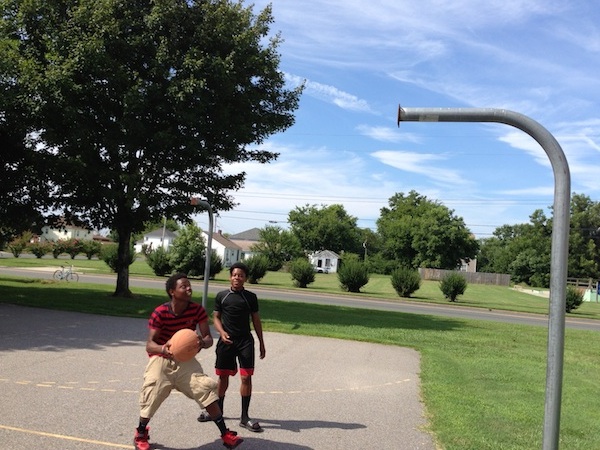LETTER: Animal Compassion Is More than Just Pets
February 16, 2015
DEAR EDITOR,
I read Wayne Creed’s article (“Animal Abuse, Theft Highlight Longtime Problems”) with great interest, being aware of the minimal care frequently afforded companion animals by their owners on the Eastern Shore. Friends who moved to Accomack three years ago were so distressed by the harsh treatment of dogs and other animals they observed in many yards that they started providing straw bedding, food and education, even doing repairs in some instances.
Their experience was that while some of the pet owners they helped were happy to receive the purchases and labor, it did not appear they would follow up on their own. Last time we talked, my friends said they had to step back from the toll the situation was taking on their own mental health and resources.
But it isn’t only dogs and cats who suffer from abuse and neglect on the Eastern Shore (and in other parts of Virginia). Chickens and many other animals suffer through every phase of their existence as a result of their status as agricultural animals.
Many of those who abuse and neglect their companion animals work in animal agribusiness where a total lack of compassion for animals, even pleasure in watching them suffer, prevails. People who spend their days being violent toward chickens and other farmed animals as part of their job often bring the violent culture of their employment home with them.
How many residents know that a Virginia statute titled “Care of Agricultural Animals by Owner” (Section 3.2-6503.1) allows the owners of agricultural animals to deprive their animals of food and water up to the point of starvation and dehydration and exempts the owners from providing bedding or shelter, regardless of the weather, for their animals? [Read more…]
COMMENTARY
Eastern Shore ‘Too Special to Drill’? –Nope

EXHIBIT A: The Chesapeake Bay at Cape Charles.
By JAY FORD
Virginia Eastern Shorekeeper
February 16, 2015
As part of the Administration’s announcement of new leases for offshore drilling, Secretary of the Interior Sally Jewell continually stated, “Some places are too special to drill.” Apparently, Virginia and the Eastern Shore didn’t make the cut.
Virginia’s Eastern Shore is the largest remaining stretch of coastal wilderness on the entire eastern seaboard of the United States. Additionally, the Eastern Shore has been recognized by the United Nations as an International Biosphere Reserve, and as a Western Hemisphere Shorebird Network Site. There is no place on earth like Virginia’s Eastern Shore; the very definition of special.
Less than five years since the BP disaster overwhelmed the Gulf Coast, our leaders are ready to open our region to the same risks. Our culture, our economy, and our quality of life are inextricably linked to the waters of the Atlantic and the Chesapeake Bay. Our booming aquaculture industry, fisheries, and tourism all depend on clean waters and are susceptible to the slightest changes. Even if we never had a major spill we would have tarballs on our beaches, and drilling fluid, toxic metals, and metal shavings in our ocean as part of the standard operating practice for an offshore rig.
If a spill were to occur, our very way of life on Virginia’s Eastern Shore would be forever altered. Researchers on the Gulf Coast are still trying to quantify the long term damage done to that region’s ecology as a result of oil and the subsequent dispersants. Mutations, deformed hearts, lesions, and sterility have been documented in staggering numbers throughout the fish population. Corals were wiped out, taking with them millenniums old ecosystems. Shrimp with no eyes and/or eye sockets were reported. Petroleum products and oil dispersant has been found in the shells of blue crab larvae and pelican eggs. When asked to put a dollar figure on the ecological damage many researchers had but one answer: “Priceless.” [Read more…]
LETTER: County Re-Zoning Paper Full of Misinformation
EDITOR’S NOTE: The following letter from Ken Dufty was received just before press time and after two other stories had been scheduled for publication on the county re-zoning issue. Letters from readers with differing views are welcome.
January 9, 2015
DEAR EDITOR,
It is apparent that the Northampton County Board of Supervisors, as directed and orchestrated by Parliamentarian and Administrator Katie Nunez, has the administrative pedal pressed firmly to the floor and is speeding towards a checkered flag in a race to completely rezone our county into something it was never meant to be. They claim that in order to keep on schedule, the Board will have to vote on the 200-page zoning revision by March 4, 2015. And on February 18 and 25, at the Kiptopeke Elementary School and Occohannock Elementary School respectively, “public information sessions” will be held to “inform” the public on the consensus of the Board on these major changes.
Claiming that the citizens are misinformed, and are indeed misinforming others, regarding the hundreds of changes to the current zoning that are being proposed, the county website directs the citizenry to access the “Citizen Information Paper” recently penned by economic development director Charles McSwain, which was widely distributed to town, village, and other officials throughout the county. This paper is available on the website, and indeed Mr. McSwain spends many pages refuting claims made by interested parties engaged in this debate.
One of the primary issues discussed by Mr. McSwain in his widely distributed public relations piece is the citizens’ claim that a wide variety of invasive uses would be allowed in agricultural lands that are not allowed in the current ordinance. So on page 16 McSwain presents a list of uses in agricultural lands that will be allowed by-right (no notice to abutting landowners, no public hearing), and those that will require a Special Use Permit. So the average person reading this list would believe that what is listed will be the extent of what we could expect if, and I say a big “if,” the proposed zoning ordinance is adopted and survives challenge (which is highly unlikely, I am happy to say). [Read more…]
COMMENTARY
Resounding Defeat for Home-Prepared Food

Virginia Food Freedom lost big in Richmond — but they’ll be back to lobby again next year.
By KAREN GAY
Cape Charles Wave
February 9, 2015
If you read my previous two articles about Virginia House Bill 1290 you may be wondering how it all turned out. This bill was designed to exempt food prepared or processed in a private home or farm from government inspection provided that the food is sold directly to the end consumer and is labeled with the producer’s name, address, and product ingredients and the disclosure “NOT FOR RESALE — PROCESSED AND PREPARED WITHOUT STATE INSPECTION.”
The bill came up before the House Agriculture Subcommittee February 2, and the meeting was held in a smallish conference room that had standing room only. About half of the non-delegate attendees represented the Virginia Farm Bureau, the Virginia Agribusiness Council, and their supporters. The other half were mostly small farmers who traveled at their own expense to plead their case. Delegate Robert Bell from the 58th District (Charlottesville) introduced the bill. Then it was time for supporters to speak to the committee members.
The first speaker was Duane McIntyre who drove six and a half hours from Russell County. He placed cigarettes, honey, alcohol, and meat on the conference room table as examples of commonly sold items that are known to have safety issues. Bernadette Barber spoke about her son’s febrile seizures as a young child and how he recovered by eating raw honey and milk from her own cow. Store owner and a member of the Fauquier County Board of Supervisors Holder Trumbo said he believes that this bill should be passed so that small farmers can keep their expenses to a minimum and make a living.
It was clear from the opponents that their concern was the sale of raw milk — even though the bill encompasses more than that. Wearing his white lab coat, Dr. Sam Bartle of the Virginia Chapter of the American Academy of Pediatrics said there were no studies on the health aspects of raw milk (although I found several articles in the PubMed library of medical studies). Other speakers were Dr. Tom Massey of the Virginia Veterinary Medical Association, Lindsay Reams of the Virginia Farm Bureau, Brad Coperhaven of the Virginia Agribusiness Council, and Sam Towell, Deputy Secretary of Agriculture and Forestry, all of whom spoke out against raw milk in particular. [Read more…]
WAYNE CREED Takes on the Historic Review Board

House under construction at 404 Jefferson Avenue towers over its boarded-up neighbor. The Historic District Review Board vetoed sliding glass doors on the front of the house. (Wave photo)
EDITOR’S NOTE: Last week dauntless social critic Wayne Creed attended a meeting of the Cape Charles Historic District Review Board. His report and rant appear below.
By WAYNE CREED
Cape Charles Wave
February 2, 2015
The Historic District Review Board met January 29 to consider requested modifications to the Board’s earlier approval of plans for a new home at 404 Jefferson Avenue. Owner Gregory Manuel requested permission to add a second-story covered porch on the front of the house, a dormer on the west side, sliding glass doors to access the porch, and additional stairwell windows front and back.
Chairman Joe Fehrer called the session to order at 6 p.m.; however the applicant called to say that he was delayed due to an automobile accident. In the meantime, Mr. Fehrer observed that a large dormer had already been built, and framing for the porch and sliding glass doors had also been started. Those features had never been approved by the Board, which Fehrer said was “disappointing to me.”
Moments later the applicant rushed in, out of breath. Assistant Town Clerk Amanda Hurley, who was taking notes, stopped the meeting to bring him a glass of water. Fehrer then asked him, “Why would you build a dormer outside the scope of the original approval?”
“I don’t mean to overstep my bounds,” responded Manuel. “[Code Official Jeb Brady] said to stop. We did stop when Jeb asked. I will not make a habit of it.”
Fehrer noted that dormers had been approved by the Board in other instances, yet he was skeptical in this case. “They must meet historic guidelines,” he emphasized. Jeb Brady quickly added that there are several examples of dormers throughout the town.
Relative to the second-story covered porch, Fehrer pressed the applicant to explain the necessity of the new design. Manuel stated that he wanted to provide water views, and that “It is a small house. We wanted to increase the space.”
This is the first house in town to incorporate sliding glass doors on the front (façade) of the house, prompting Fehrer to respond that they did not appear to fit in with the historic character of the town. “They are not appropriate for the Historic District. I’m loath to make an approval that will set a precedent,” he said.
Manuel then asked Code Official Brady, “There are examples of this?” He then offered the Board some alternatives that they might find more palatable, everything from adding muttons to changing the design to incorporate French doors. Punctuating the exchange, Manuel’s cell phone rang and rang, as it would several more times during the meeting.
Chairman Fehrer held that he preferred one door and one window rather than sliding or double French doors, because “it would keep it in more of the character of the town.” Manuel retorted, “Have you seen the other houses next to it? Have you seen them?” [See above photo.] [Read more…]
LETTER: Basketball Not Just About Throwing a Ball

When the Planning Commission approved the rezoning of park property for an apartment house, it stipulated that the basketball court be replaced. Town Manager Bob Panek ordered basketball backboards and nets removed December 26, 2012, for “safekeeping,” and nothing more was done other than a brief effort by Shanty owner John Dempster to spearhead civic involvement in building a new court. Town Councilman Steve Bennett later reported that according to a survey he conducted, only 12 percent of town residents were in favor of a basketball court. (Wave photo)
February 2, 2015
DEAR EDITOR,
A few years ago we discovered the gem that is Cape Charles and purchased a house on the north side of Peach Street. One of the selling features for me was the proximity to the park and basketball court. Although my basketball-playing days are drawing to a close I enjoyed ambling over to the court in the early evening to observe the games, offering tips to the younger players and engaging in playful banter with those closer to my age.
I was quite surprised when I learned the rims and backboard had been removed without notice and there was no replacement location identified for the court. Where will the community youth be able to play basketball? I wondered. After a few moments of reflection, I realized that the importance of the basketball court was expanded beyond simply a recreational location. The basketball court is a place where participants can learn life-skills. [Read more…]
LETTER
Slow Down, Supervisors — This Is God’s Country
January 26, 2015
(EDITOR’S NOTE: Penny Lusk wrote the following letter to Northampton County Supervisors, and requested the Wave to publish it. We are pleased to do so.)
To: Chairman Richard Hubbard, District 4; Granville Hogg, District 1; Larry Trala, District 5; Larry LeMond, District 2; Oliver Bennett, District 3
SIRS,
Outside of Fort Adkins, Wisconsin, in the hill country, you might come upon a sign on the side of an old barn. In large letters it reads, “Slow down. This is God’s country.” Is the sign meant to slow traffic or to get folks to stop and see beautiful nature, or, in the stopping and looking, to soul-search about what is important for good living? The stalwart agrarian folk of that area have a good handle on nature, hard work, and community.
Please, please, Northampton Board of Supervisors, slow down with these new zoning plans. Eastern Shore families have the same basic values as those rural Wisconsin folk. If rural is unattractive, why are so many young adults coming back. They are black, white, and Latino. They are medical professionals, entrepreneurs, small business starters, teachers, lawyers, contractors, aquaculture farmers and workers, organic farmers, artists, and tour guides. Many employ others, and all pay taxes. Some work several jobs just for the privilege of living here and raising their children in this rural environment.
The economic crash of ’08, mostly due to speculation gone awry, left us here in Northampton County with many subdivided lots sitting empty, causing costs to the county and loss of state funds for our schools.
On the plus side, since then, aquaculture and tourism have boomed and more small businesses have come and stayed. Organic farming is growing, our conventional farming is stronger, and our nursery businesses remain healthy. How incredible is all this that such a tiny county with a limited aquifer and a fragile but very special environment with rare habitat could prevail!
We are also blessed with retired citizens who have come with experience and expertise because they like what we are and what is here. They have seen their worlds paved over in the name of progress. They bring their grandchildren here to see the stars. We really do shine in today’s world. [Read more…]
COMMENTARY
Legal Followup on Selling a Pie to Your Neighbor
By KAREN GAY
Cape Charles Wave
January 26, 2015
Martin Luther King Day was an appropriate day for the many advocacy organizations to come together at the Richmond General Assembly for their Lobby Day. This is a day in which individuals and groups can visit their Senator and Delegate and express their interest in pending legislation. I attended to promote a bill to allow the farmer and individuals the right to create food products in their home for sale to individuals without government intervention. These products would need to be labeled as not government inspected and could not be sold for resale.
House Bill 1290 would allow you or your neighbor to bake a pumpkin pie and sell it to someone who wants to eat home-baked goods but may not be able to make it himself. Older folks who can’t get out of the house to shop could order meals from a neighbor and provide a livelihood for a stay-at-home mom and obtain good nutrition in return. This is the lowest level of commerce, and the ability to fend for oneself in the kitchen should be available to all citizens.
The problem with Virginia regulations is that they are geared to an industrial product in which a farmer has acres of corn, soy, and wheat, or a factory that produces sterile, shrink-wrapped food. There is a whole subculture of individual entrepreneurs for whom these laws do not work. The legal bar to creating a small home-based food business is so high that many people operate small businesses illegally, or look for a low-paid job with a retailer in which they have no personal investment aside from putting in the specified number of hours.
Working for oneself empowers people to think creatively and is the historic foundation of the economy in our country. However, our laws in Virginia stifle the individual in favor of the corporation or corporate farm. I advocate a two-tier system of laws that support both small and large enterprises. This approach would provide maximum choice to individuals who could then decide for themselves what kind of food they prefer to buy. This provides opportunity for everyone.
Let me tell you about two of the people I met who support the Virginia Food Freedom bill: [Read more…]



















